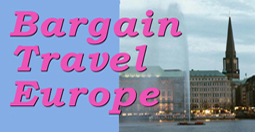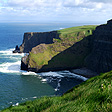DRIVING IRELAND
Scenic Irish Countryside Tour Routes
 Ireland is a land
meant to be driven. Sure there are trains, to some places – but the rail system is relatively limited. Buses, if you
want to wait, and go where they go. But to discover the dramatic coastlines
of roiling seas below rocky cliffs, green fields of bleating sheep and
inquisitive cows grazing beside ancient abbey ruins, charming villages,
romantic castle and country mansions among the rolling hills at your
own pace, rent a car. Through much of Ireland, you’ll often find
the road mostly to yourself. High speed dual track motorways are few
and near the big cities of Dublin and Belfast. Most of Ireland’s
roads are two lane highways or country roads. The roads are well maintained
comfortable to drive. Should you wander off track a bit you can find
narrow country lanes, but not as many as you might think.
Ireland is a land
meant to be driven. Sure there are trains, to some places – but the rail system is relatively limited. Buses, if you
want to wait, and go where they go. But to discover the dramatic coastlines
of roiling seas below rocky cliffs, green fields of bleating sheep and
inquisitive cows grazing beside ancient abbey ruins, charming villages,
romantic castle and country mansions among the rolling hills at your
own pace, rent a car. Through much of Ireland, you’ll often find
the road mostly to yourself. High speed dual track motorways are few
and near the big cities of Dublin and Belfast. Most of Ireland’s
roads are two lane highways or country roads. The roads are well maintained
comfortable to drive. Should you wander off track a bit you can find
narrow country lanes, but not as many as you might think.
 Most trips to Ireland
will begin in Dublin, Belfast or Shannon where the major airports are
located. Driving in the Republic of Ireland and
in Northern Ireland, despite their being two different countries is very
much the same. You’ll hardly notice a difference, except for the
road signs. Driving throughout the entire island of Ireland is on the
left, as in England. The speed signs in the Republic are in kilometers
and in miles in Northern Ireland. In the Republic of Ireland the signs
are in English and Gaelic, while in the north English is the rule, through
some local signs may also have Ulster Scots or Gaelic. You should inform
the rental car company if you intend to drive in both countries. Most
car rental companies stock a majority of manual drive cars, if you require
an automatic transmission, reserve well in advance, especially in the
summer. Most rental car companies have age restrictions, so check availability
if under 25 years or over 70.
Most trips to Ireland
will begin in Dublin, Belfast or Shannon where the major airports are
located. Driving in the Republic of Ireland and
in Northern Ireland, despite their being two different countries is very
much the same. You’ll hardly notice a difference, except for the
road signs. Driving throughout the entire island of Ireland is on the
left, as in England. The speed signs in the Republic are in kilometers
and in miles in Northern Ireland. In the Republic of Ireland the signs
are in English and Gaelic, while in the north English is the rule, through
some local signs may also have Ulster Scots or Gaelic. You should inform
the rental car company if you intend to drive in both countries. Most
car rental companies stock a majority of manual drive cars, if you require
an automatic transmission, reserve well in advance, especially in the
summer. Most rental car companies have age restrictions, so check availability
if under 25 years or over 70.
 Driving on the left
takes a bit a time to get used to if you come from America or continental
Europe, use the centerline of the road as a guide,
because the distance on the left hand side of the car can be a little
difficult to judge. Many intersections are roundabouts which go clockwise,
give way to on-coming traffic from the right in the circle. Speed limits
in the Republic are 50 kilometers per hour in built up areas, 80 kph
on rural country roads, 100 kph on national two lane highways and 120
kph on motorways – in the north 30 mph in towns, 60 mph on open
roads and 70 mph on motorways. Road signs use international symbols.
Getting a GPS with a rental car is a good idea, you’ll be very
happy to hear a guiding voice calmly telling you that you’ve missed
your turn, though that “recalculating” does have a certain
put-upon sarcastic tone.
Driving on the left
takes a bit a time to get used to if you come from America or continental
Europe, use the centerline of the road as a guide,
because the distance on the left hand side of the car can be a little
difficult to judge. Many intersections are roundabouts which go clockwise,
give way to on-coming traffic from the right in the circle. Speed limits
in the Republic are 50 kilometers per hour in built up areas, 80 kph
on rural country roads, 100 kph on national two lane highways and 120
kph on motorways – in the north 30 mph in towns, 60 mph on open
roads and 70 mph on motorways. Road signs use international symbols.
Getting a GPS with a rental car is a good idea, you’ll be very
happy to hear a guiding voice calmly telling you that you’ve missed
your turn, though that “recalculating” does have a certain
put-upon sarcastic tone.
TOURING ROUTES
There are a number of varied travel touring routes to explore the Irish Isle which can be found on the Discover Ireland official tourism site, though you don’t have to follow any specific trail. Sometimes blazing your own trail is half the pleasure, through here are some of the more popular.
Ten Day Tour - The coastal circle tour of Ireland takes you around the entire island, generally following the coast, from Dublin to Tramore and Cork, Killarny and Galway, Donegal and Derry, Belfast and back to Dublin, with side excursions along the way. Allow at least 10 days to make a circuit, but two weeks is probable better to really enjoy this.
Ring of Kerry - The most famous scenic drive in Ireland is the “Ring of Kerry”. The circle route can be made in a day, but a stop-over or two allows a little more leisure enjoyment. The Ring of Kerry drive is located far south western region of Ireland and takes at least a full day to get to from Dublin so is better suited to Shannon arrival.
The Burren – The region of rock strewn badlands of hazel woodland and wildflower decorated gray stone escarpments in north western Country Clare (see The Burren), also in the west of the island south of Galway Bay can be combined with the ring and a visit to the famed Cliffs of Moher.
Connemara – A two day driving tour of west Ireland Connemara, beginning and ending in Galway takes you through the beautiful County Mayo country, so representative of the Ireland mystique, many of its locations were used as the backdrop for the film “The Quiet Man”.
Coastal Causeway - Many visitors to Ireland think only of going south to Cork and Kilarney, but the north of Ireland is just as fascinating. The “troubles” of Northern Ireland long kept tourists away, but no longer a worry for the casual outside visitor. The Causeway Coastal Route drive leads from Belfast, along the northern coast to Ireland’s legendary Giant’s Causeway, through Bushmills (see Bushmills Whiskey Tour) and Portrush to Londonderry (see Londonderry Arms Hotel).
Scotch-Irish Heritage – From Derry south to Omagh and Enniskillen takes you through the farmlands of Ulster whence the Scotch-Irish of early American heritage came, stop at the Ulster American Folk Park and drive the beautiful Glenelly Valley of County Tyrone.
Braveheart Drive – Southwest from Dublin County Wicklow is known for its golden sandy beaches, wooded glens, and waterfall cascade. It is here the beautiful scenery was used as the backdrop of the Mel Gibson movie “Braveheart” – a story about Scotland, but filmed in Ireland. The Braveheart Drive is a one day circle tour around west Wicklow from a town called Hollywood.
In making your own driving tour of Ireland, you needn’t follow any prescribed route. Spend a little time finding where the special places are in the Emerald Isle you might like to see and just head out. From the underground caverns of the Marble Arch Geopark near Enniskillen to the Rock of Cashel near Limerick, the lucky stone of Blarney Castle in Cork, to the site of the Battle of Boyne, the Hill of Tara, and Trim Castle in County Meath, just about every direction will lead to fascination and beauty. © Bargain Travel Europe
Find best hotel and travel deals in Ireland on Tripadvisor
Web
Info
Discover
Ireland
Touring
Guides
These articles are copyrighted and the sole property of Bargain Travel Europe and WLPV, LLC. and may not be copied or reprinted without permission.
SEE ALSO:
25 FREE THINGS TO DO IN IRELAND
BEST
BUDGET DUBLIN AIRPORT HOTEL


